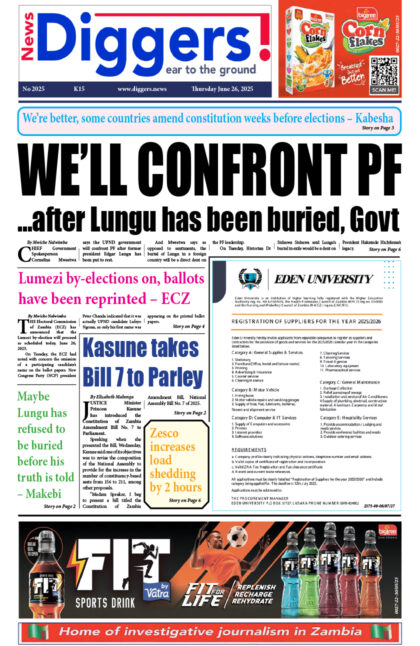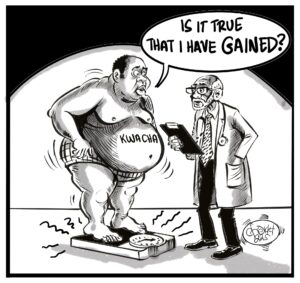Zesco Limited managing director Victor Mundende says the deal to start importing 300 megawatts of electricity from South Africa’s Eskom has stalled because that utility is demanding to be paid two months’ security deposit of US $41 million.
And Mundende says that the US $250 million, which the utility received from government as part of the Eurobond proceeds, has been used to develop the Kafue Gorge lower hydro power project, while part of it went towards the rehabilitation and upgrading of the distribution and transmission infrastructure.
Speaking when he featured on ZNBC’s Sunday Interview programme, Mundende revealed that Eskom demanded to be paid two months’ security deposit of US $41 million before Zesco could be allowed to import 300MW from South Africa.
“We are trying to import about 300 megawatts from South Africa. We are also trying to import from Mozambique. We have already concluded our discussions with South Africa. We were supposed to have started by 1st October, but again, we have some challenges! There are three issues that are coming out of that deal (i) Eskom is demanding security deposit of two months because the price of 300 megawatts is US $20.5 million per month; (ii) Eskom is demanding that we pay them the arrears that we incurred during the 2015/2016 power crisis, (which) we still owe them; and (iii) we try to ensure that we pass through this cost to the consumers because we cannot go back to the situation of 2015/2016 and incur huge cost. Remember, these debts if you are not servicing them, interest is growing,” Mundende disclosed.
And asked about how Zesco utilized the US $250 million received as part of the proceeds from the eurobond, which it got from government, Mundende said part of it went towards the upgrading of the Kafue Gorge, among others.
“Firstly, I want to commend government for their support with the eurobond funding. Yes, of course, we received US $250 million. Part of that money went to our flagship project [where] we are undertaking the Kafue Gorge lower hydro power project. This project will come to fruition next year. We will be commission Kafue Gorge lower project starting from April; we will be commissioning one machine and we will complete the plant by August, next year. So, the eurobond money is working. Part of that money, again, was used to rehabilitate and upgrade the distribution as well as the transmission infrastructure. So, yes, the eurobond money was given to Zesco and we have used it prudently,” he replied.
But when asked why Zambia had continued exporting power when the country was engulfed in a perpetual power crisis, Mundende said the amount of electricity being exported was too minimal to change the power deficit equation.
“We are exporting a bit of power. We have eight neighbours and most of our neighbours or border towns for our neighbours are supplied from Zambia. For example, Mukambo from Congo DR there, Porto and Sakanya in the Congo border. In Malawi, we also have Muchinji, but you see, in other cases, we are also importing like in Chama and Lundazi, we import from Malawi. And the cost of imports, actually, is even lower than what we are exporting at Muchinji. But if you look at the amounts of power that we are supplying, they can’t change the equation. They are just powering small towns on the borders. And in order to foster good relations, I think a good neighbour is seen when there are issues. And giving them 12 megawatts at Muchinji won’t change any equation even if I don’t give them,” Mundende said.
When programme host Gravazio Zulu asked him why Zesco cannot import electricity without passing on the burden to local consumers, Mundende said cost needed to be shared to avoid the shutting down of businesses.
“I think that is business. Even if Zesco had a lot of money, if they just start subsidizing all categories of customers, one day, that money will finish! It’s not sustainable in short. (For) any business to be sustainable, it needs to make profits. What the people need is power, so, we can import that power and pass through the cost so that businesses can be able to run,” Mundende explained.
He added that Zesco was in the process of setting up numerous coal and wind energy plants in direct parts of the country.
“We have already partnered with EDM (Electricidade de Moçambique) of Mozambique, which is a power utility in Mozambique. We are going to construct a 1,200 megawatts of coal in Tete because there are huge coal reserves in that area. And we have also just concluded our studies of solar. We are going to put up about 500 megawatts of solar. Our panels will be our reservoirs. In Itezhi-tezhi, we will have a 100 megawatts; in Kariba, (there is going to be) 200 megawatts, in Kafue Gorge, the new reservoir that will be created will have another 200 megawatts of solar. King Muhammed of Morocco had come into the country and we signed a deal for 200 megawatts with a company called Masen. That plant will be situated in Serenje. The deal with Masen, we are also doing a 150 megawatts of wind, which will be around Serenje as well. We intend to commission these before the end of next year,” Mundende said.
“So, going forward, we see a situation where we want to realize our dream. Our vision, as Zesco, is to be a hub for power trading in the region, [and] a net exporter. We are well placed in terms of geography; we have eight neighbours and, therefore, we are busy trying to do interconnectors. Some of these actions are called ‘acts of God.’ We are not the ones who are dealing with climate change, but we are a Christian nation (and) we know that God has got a purpose for everything. Climate change is affecting everyone,” he bemoaned.
Meanwhile, when querried when Zambia’s persistent load shedding problem was expected to end, he promised that the deficit would be addressed by end of next year.
“Like I explained, our flagship programme will be completed by end next year. Our deficit now is about 700 megawatts (and) we are bringing on board about 750 megawatts. The solar farm that I talked about will bring on board about 750 megawatts of power. Therefore, we see a situation where I don’t expect to see what we are experiencing now come end of next year,” said Mundende.
“We have been implementing those austerity measures [and] I can cite an example. We have reduced drastically on travel, we have reduced on overtime. When I came in as managing director, I was not given a bonus. I am very unpopular, but because I don’t want to be wasteful. If we were making profits, we would have been giving bonuses. We inherited what we call ‘staff tariffs’ where we would give free power to our employees. We have managed to reduce that by half the quantum that is being given for the very first time in the history of Zesco! We are regulated. If you are regulated, you have to play by certain rules. If, today, Zesco was a private company, they will just tell you the cost of electricity whether you take it or leave it.”



















3 responses
Why isn’t anything planned for western province
Other thing that u need to look at is, last time I reported a meter foult it take 6 weeks to come and fix it, by the time they come to fix it 7 people come but only one person done the job, do I need to say more
You still owe them from 2015/2016 deal? Thats 3 years ago and today you have no shame to approach them again. In south africa even households pay a deposit before power can be connected and they are right to demand 2 months upfront pay from a known defaulter. Zambia has become a useless country under PF. They are stealing everything daily.